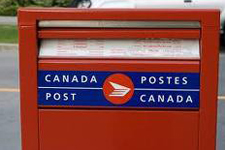Outdated business model perpetuates reckless decisions
By Roscoe Triana
Canada Post announced a decision in the summer of 2010 that they would look into rerouting all Friday mail sent from the Kootenay area in British Columbia to Vancouver for sorting prior to being delivered to the final destination.
Canada Post stating that the change “would not impact customers or jobs in the area.”
Starting in November, 2010 that decision was implemented, with all Friday local mail sent to a mechanized sorting plant in Vancouver for processing.
The rule stipulates that if mail is dropped in a red Canada Post mailbox on a Friday, the mail must go to Vancouver to be sorted regardless of the final destination.
Looking at the logistics of this trip, when a person sends a letter from Winlaw to Nelson the letter will go to Vancouver prior to delivery to Nelson. Winlaw is 50 kilometres from Nelson and the usual turn around for a letter is one business day and, at most, two business days.
Vancouver is 637 km. away from Nelson — over 1,000 per cent more in distance each way from Nelson — and now requires air cargo, jet fuel and weekend staff to deliver the mail, given this applies to Friday drops. If you add up the cost of that alone, and remember this example is for one letter, I think you get the picture.
This is not the first time Canada Post decided to change sorting locations with the promise that “no jobs would be lost and service would not be affected.” A postal worker who chooses to remain anonymous tells me that mail sorted in Vancouver can take up to five business days to get back to Nelson for delivery.
That is most definitely an interruption in service and I am certain this kind of interruption has occurred in each case where Canada Post made these “sorting” decisions throughout the country. Not to mention the loss of temporary jobs, which are critical to small community employment and full time jobs due to downsizing.
Let’s examine the history of these Canada Post “sorting” decisions.
• In September, 2006 a decision to close Quebec’s Saint-Paul Street sorting facility was announced along with the promise that “no regular employees will lose their jobs.”
• In March, 2010 Canada Post conducts a review to consider moving some work to sort mail mechanically at the Saint John N.B. from the Moncton facility. Canada Post spokesman John Caines stated, “No final decision has been made, but be assured that the Moncton facility will remain open and the Corporation will continue to respect all of its collective agreements. No full or part-time regular employees will lose their job should there be an operational realignment.”
• In October, 2010 Canada Post’s final decision was to have all Moncton mail shipped to Saint John, a two-hour drive from the depot which was five minutes across town in Moncton. This guaranteed mail delivery three to four days late — all this in the name of “optimization,” not to mention loss of local jobs.
• In May, 2010 Canada Post cut 68 mail-sorting jobs in Victoria to have mail sent to Vancouver to be sorted and sent back to Vancouver Island — after the promise that no jobs would be lost. Currently, all Victoria mail is shipped to Vancouver for daily sorting. The same occurred for eastern Ontario’s rural communities when the sorting was moved to Ottawa.
Canada Post explains that the decisions are made to deal with declining mail volumes in the age of email and faster communications. Perhaps if Canada Post had been forward thinking and anticipated this reality they may have been able to trash the old business model and restructure to provide services that meet today’s communication needs.
After all, one has to wonder what they were doing? Were the senior people and marketing managers oblivious to email? Perhaps none of the chair and board members, CEO or any upper executive members were ever online for the last 20 years?
The world has changed for everyone, companies adjust, use forward thinking strategies and either continue or close. I guess they were too busy planning for unnecessary million dollar sorting facilities to care about providing valuable services for their customers.
From the start the CPUW union feared that the “sorting” decision was a move to relocate all mail sorting operations to Vancouver. Little did they know that this was actually a plan to eliminate all rural Canadian sorting services. As if rural Canada doesn’t already have enough of a struggle keeping its head above the poverty line.
Rural Canada is the keeper of this great country. It is the rural people of Canada who live in wholesome and considerate ways, honouring the kind of long standing traditions that preserve the planet.
Instead of rewarding rural Canada with the mere privilege of keeping jobs who they themselves have generated, Canada Post, as one of Canada’s largest corporations, decided to stick their head in the sand to avoid admitting how unthinkably backward they are and emphatically excuse their decision as due to “declining mail volumes.”
In an attempt to get an update on the British Columbia Interior decision and the implementation of the mechanized sorting I placed a dozen calls to a Canada Post communication representative, which resulted in voice mail with no returned calls.
Several Canada Post employees were forthcoming; however, they chose to remain anonymous due to hesitations regarding possible reprimands.
John Bail, national director of CUPW spoke with me about the decision to sort mail in Vancouver. “The CUPW believes that the work that is created for Canada Post in the communities should remain in those communities,” he said.
“Canada Post has an obligation to the public to maintain a presence in all communities and to create a level playing field for its customers, regardless of where they choose to live in Canada.”
The CUPW has recently begun negotiations with Canada Post stating that “sorting” decisions are one of the top priorities in a list of 99 issues being looked at.
Here’s a thought: what if a total boycott of Canada Post occurred, stopping the use of sending any mail or parcels. There are far better competitive services for parcels. Letters can be substituted using email and physical letters can be sent in parcels. We all know that when there is an opportunity for small business to fill a gap someone will meet the challenge.
You may think that a boycott would cause even more job losses, however, consider this: Canada Post will continue to make these kinds of decisions until we have no reliable service and continue inflating rates only to pay the mortgage on under used $100-million facilities, unnecessary overtime, marketing strategies that do not work, and the salaries of overpaid executives.
Any service remaining with Canada Post will be outsourced and reliability and security will be non-existent until total failure will force the corporation into bankruptcy. This corporation has held us hostage for long enough, why not look for alternatives ourselves, or even better, create our own alternatives?
Roscoe Triana’s background includes working on investigative journalism documentaries with the Canadian Broadcasting Corporation. He is also one of Canada’s esteemed Gemini award winners. His monthly Nelson Daily column SURVIVING, will cover a wide range of topics focusing on local, national and international issues dealing with everyday life and the world today. You can contact Roscoe Triana at editor@thenelsondaily.com























